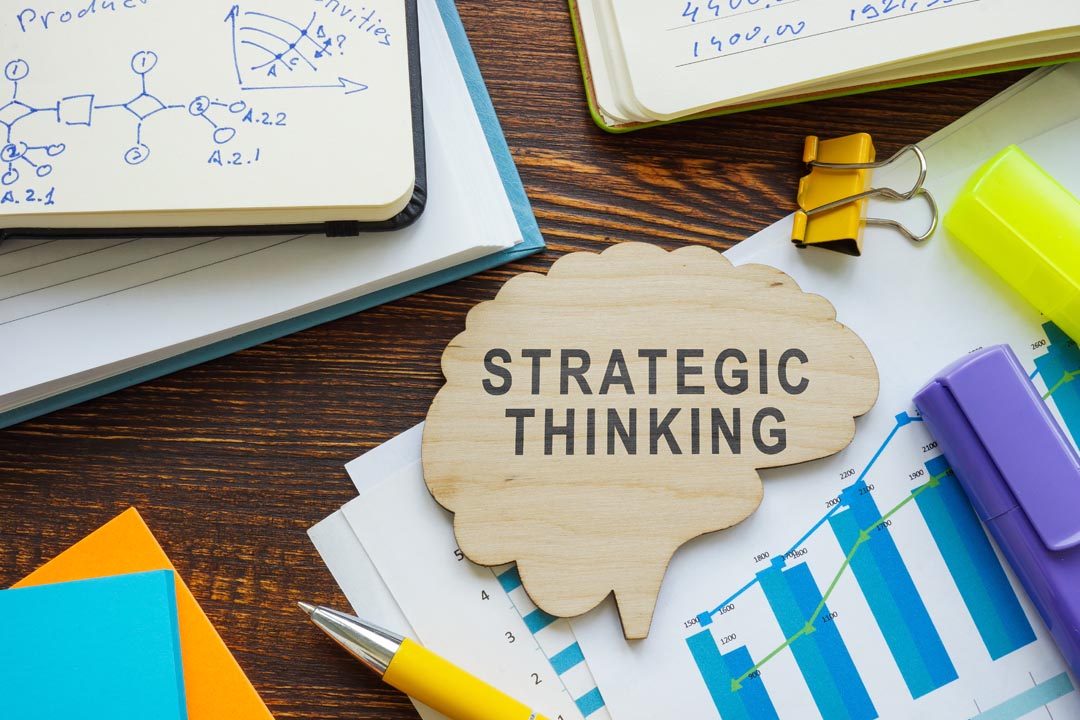Michael Watkins, author of The Six Disciplines of Strategic Thinking, explores how to unlock your potential and develop your strategic thinking muscles
Strategic thinking is a vital skill for leaders navigating their businesses through today’s turbulent waters. Your capacity to think strategically is shaped by your endowment – your innate cognitive abilities – and your experience in situations demanding strategic thought.
You can enhance your strategic thinking abilities by playing specific games regularly
By the time you reach adulthood, your natural abilities are largely established. You should, of course, continue to seek experience in roles that require strategic thinking. However, another powerful way to enhance your capacity to think strategically is to build your mental muscles by engaging in cognitive exercise.
Understanding the six disciplines
Strategic thinking is the set of mental disciplines leaders use to recognise potential threats and opportunities, establish priorities to focus on, and mobilise themselves and their organisations to envision and enact promising paths forward. The first three disciplines, pattern recognition, systems analysis, and mental agility, lay the foundation for recognising and prioritising your organisation’s challenges and opportunities.
- Pattern recognition involves observing complex, uncertain, volatile, and ambiguous business scenarios to identify essential changes.
- Systems analysis is how you mentally model complex situations as systems and leverage these models to make predictions and develop strategies.
- Mental agility refers to your capacity to explore business challenges using different levels of analysis and anticipate the actions and reactions of other stakeholders.
The other three disciplines, structured problem-solving, visioning, and political savvy, enhance your ability to mobilise your organisation to respond to emerging challenges and opportunities.
- Structured problem-solving helps you guide your organisation in framing and solving complex problems.
- Visioning allows you to imagine ambitious yet attainable futures, inspiring your organisation to achieve these goals.
- Political savvy involves understanding the influence dynamics within and outside your business and using this knowledge to build alliances with key stakeholders.
Playing games to build your capacity
Disciplining oneself to engage in any exercise, including mental workouts consistently, is a challenge. Thankfully, research shows that gamification, which applies game-design elements to learning, makes mastering complex skills more enjoyable and effective. So, you can enhance your strategic thinking abilities by playing specific games regularly. The fun nature of games makes learning more pleasant and improves your retention and practical application of these skills.
Then comes the choice of suitable games. Ideally, there would be a dedicated app for developing strategic thinking (Lumosity probably comes closest as a single source). In its absence, the next best option is to select a set of short, easily accessible games that provide the right kinds of mental exercise. Short games allow you to engage in cognitive development, even on busy days, without an unsustainable time commitment. The ease of accessing these games, often online or on mobile devices, allows for convenient playing. Also, the variety offered by different games keeps the regimen interesting.
Developing a sample workout
To illustrate the approach, I developed and engaged in a daily exercise regime consisting of six strategic games. My regime begins with Wordle, an engaging New York Times site puzzle that sharpens pattern recognition skills by challenging players to discern letter patterns and word structures. Next is Connections, another New York Times game that further challenges pattern recognition and mental agility by requiring shifting perspectives and thinking about words in different contexts.
Sudoku, a puzzle involving logical deduction within a defined structure, is excellent for honing your structured problem-solving skills. The Daily Chess Puzzle on Chess.com (subscription required) exercises your pattern recognition and mental agility capabilities by requiring you to think about chess positions and potential sequences of moves.
Hitori combines mathematical problem-solving with analysing interrelationships between numbers, further developing systems analysis and structured problem-solving. Lastly, Monument Valley adds a unique dimension by enhancing spatial visioning and creative problem-solving as you envision and manipulate complex structures in imaginative ways (warning: there is a limited number of levels, and it’s addictive, so pace yourself).

This sequence of games, starting with lighter language-focused puzzles and progressively including numerical and spatial reasoning challenges, aligns with most of the strategic thinking skills outlined in my six disciplines. Each game in the regime was chosen to ensure a well-rounded cognitive workout, significantly contributing to developing strategic thinking ability.
A daily regime like this offers a practical and enjoyable way to develop your strategic thinking skills. By dedicating daily time to these games, you can gradually enhance your ability to think strategically, leading to more effective decision-making, problem-solving, and long-term planning. As you sharpen these skills, you will become better equipped to navigate the complexities of the business world and lead your organisation toward a successful future.
Planning your strategic thinking workout
The proposed strategic thinking exercise regime, consisting of six thoughtfully selected games, offers a comprehensive workout for your strategic thinking muscles. On average, completing all six games – Wordle, Connections, Sudoku, The Daily Chess Puzzle, Kakuro, and Monument Valley – takes approximately 45 minutes. However, how you choose to incorporate this hour into your daily routine can vary based on your preferences, schedule, and intensity of focus.
Here are three approaches, ranging from most to least intensive:
- The most intensive approach involves spacing the games throughout the day.
This allows for short, intense bursts of strategic thinking at various intervals. You could kickstart your day with a quick session of Wordle, followed by engaging in Connections during a mid-morning break. As you approach lunch, Sudoku can be a stimulating brain teaser, with The Daily Chess Puzzle for post-lunch cognitive recharging. In the afternoon, a session of Kakuro can keep your strategic muscles flexed.
To wind down in the evening, a Monument Valley level can be relaxing and mentally engaging. This method ensures your brain remains actively engaged in strategic thinking throughout the day, with regular stimulation. - For a moderately intensive approach, consider playing the games over two or three consecutive days.
This could involve playing Wordle and Connections on one day, followed by Sudoku and The Daily Chess Puzzle on the next, with Kakuro and Monument Valley rounding off the third day. This strategy allows for more focused and in-depth engagement with each game, providing ample time to reflect on the strategic skills each game targets. - The least intensive method is to dedicate each day of the week to one game, allowing for a more relaxed pace, including one day off.
You could start your week with Wordle on Monday, switch to Connections on Tuesday, and continue this pattern throughout the week. This approach is ideal for those who prefer to immerse deeply in one type of cognitive challenge daily, gradually building their strategic thinking skills over time.
The broader benefits of mental exercise
Research in cognitive science, psychology, and neuroscience provides valuable insights into the broader advantages of mental exercise, reinforcing the importance of regularly stimulating your brain through such activities.
Firstly, mental exercises improve memory and brain processing speed. Games that require pattern recognition, problem-solving, and logical thinking, such as Sudoku and Kakuro, are particularly effective. They challenge the brain to store and recall information, enhancing short-term and long-term memory faculties.
Another significant benefit is the enhancement of concentration and focus. Games like Wordle and The Daily Chess Puzzle demand sustained attention to solve the puzzle. Focusing intensely for a short period can improve your attention span and concentration levels.
Furthermore, engaging in these games can help reduce stress and improve your mental well-being. Activities like playing Monument Valley, which combines puzzle-solving with artistic design and a serene soundtrack, can be calming and meditative.
Finally, there’s growing evidence that regularly engaging in mentally challenging activities can slow the cognitive decline associated with aging. By regularly challenging and stimulating the brain, these exercises could contribute to maintaining your cognitive health over the long term.
Michael D. Watkins is a professor of leadership and organisational change at the IMD, a cofounder of Genesis Advisers, and author of new book The Six Disciplines of Strategic Thinking




